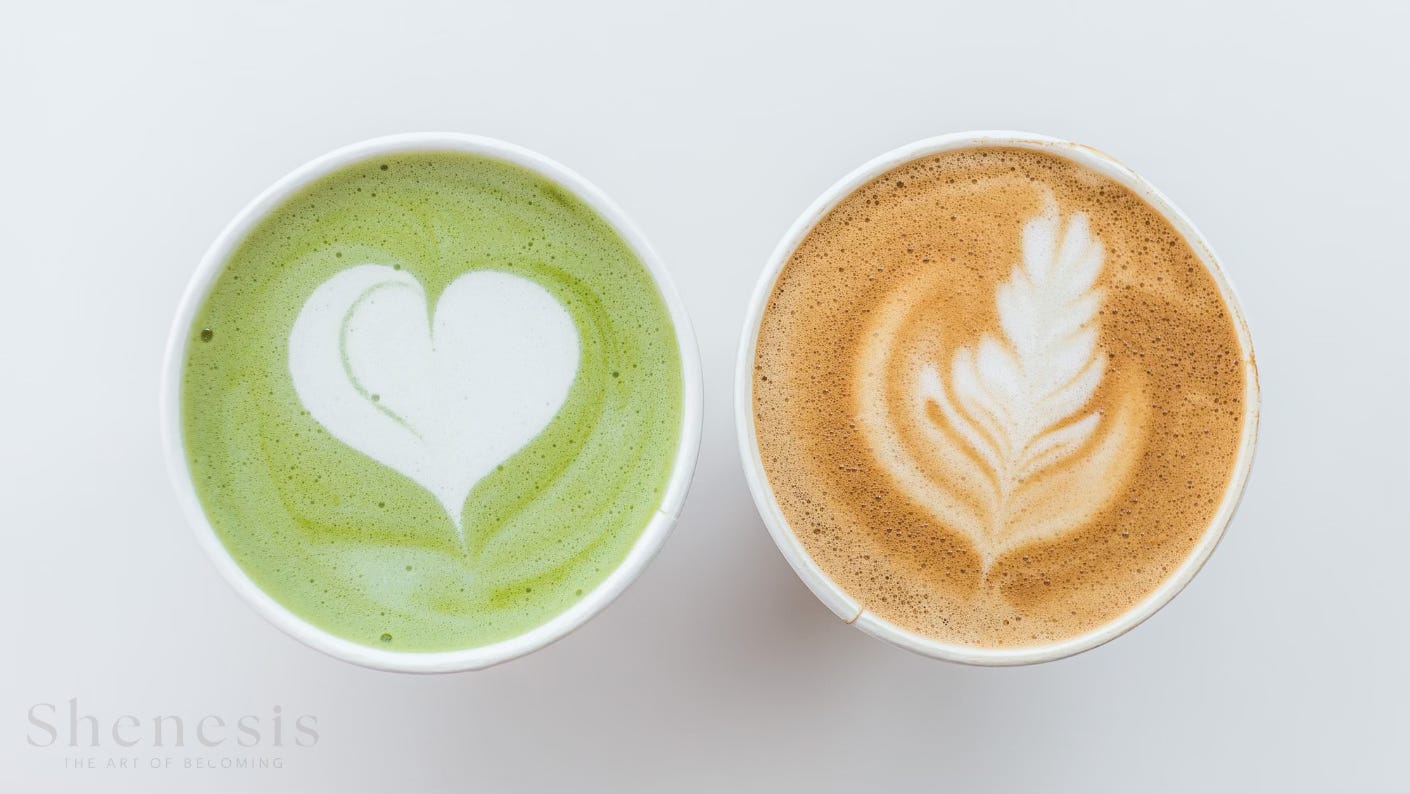Coffee: The Brain Health Elixir Science Loves (Even If You Drink It at 6 a.m.)
What science says about caffeine, brain health, and the perfect morning brew
I’m a certified brain health coach. That probably makes you think I have an impeccable, science-based, brain-boosting morning routine.
You know the kind: Wake up at 5 a.m. on the dot because I went to bed at 9 p.m., falling asleep effortlessly in a perfectly cool bedroom, wearing organic cotton jammies, nestled in breathable Egyptian linen sheets.
I wake refreshed from a glorious night of deep sleep and REM cycles, leap out of bed to catch the first rays of sunlight, gleefully anticipate my 10 minutes of journaling, 30 minutes of yoga/stretching/breathing, followed by an invigorating two-minute ice-cold shower, and start my day in an enlightened state of peak cognitive function.
Yeah. No way.
Let’s be real. I live in Brussels. It’s March. There are exactly ZERO rays of sunlight to catch at 5 a.m. Nor at 6 a.m. And since we’ve switched to daylight saving time, not even at 7 a.m.
Here’s what my actual morning looks like:
Wake up naturally around 6 a.m.: Because alarms are for people who have their 💩 together. Also, I’ve never, ever, been able to sleep longer than 6.5 hours.
Lie in bed for 5-10 minutes contemplating the world’s descent into chaos — and how it all started when David Bowie died. FACT.
Get out of bed, do a quick body check: 10 fingers, 10 toes, still upright, still spectacularly myopic. Verdict? Good enough!
Bathroom trip, contact lenses in: Left eye still blurry because of that one surprise early-onset cataract. Vision remains… aspirational.
Head to the kitchen, that’s where the coffee lives.
Choose from my arsenal of coffee-making devices: Because variety is the spice of life, and also, I might have a problem.
French press wins today: Three spoonfuls of coffee, inhale deeply, contemplate life choices, hopes deflating slightly.
But… first sip of coffee saves the day: All systems go, brain officially booting up.
Now, the day can begin. And no, I didn’t wait to drink the coffee, as it is sometimes recommended. I’m a rebel like that.
The Ritual of Coffee
This is where my day becomes interesting.
Back when I worked in an office, I drank Nespresso. Quick, efficient, not terrible. But now that I work from home, I get to take my time and enjoy the process. I have options: French press, Moka pot, Nespresso, drip or pour-over.
For the past two months, the French press has been my go-to.
The first whiff of coffee when I scoop three spoonfuls, not heaped, into the pot is one of my favourite parts of the day.
A few minutes later, the comforting aroma of the finished brew. My first cup is usually my version of bulletproof coffee, minus the butter, just MCT oil.
Then, and only then, can the day truly begin.
Related post:
Is Coffee Good for the Brain?
As it turns out, coffee is all kinds of wonderful. And science backs this up.
Regular coffee consumption has been linked to a reduced risk of neurodegenerative diseases like Alzheimer’s and Parkinson’s.
A long-term study published in Frontiers in Aging Neuroscience1 found that higher coffee intake was associated with a slower cognitive decline and a lower accumulation of cerebral beta-amyloid, the protein linked to Alzheimer’s disease.
Caffeine, the magic molecule in coffee, does more than just wake you up. It enhances alertness, improves reaction time, and even boosts memory.
Fun (Weird) Fact: MRI scans show daily caffeine temporarily shrinks grey matter in brain regions linked to overthinking (overthinkers, I see you!) like a "decluttering" effect. But don’t panic! It rebounds after several caffeine-free days, and studies suggest this may actually sharpen focus.
One study from Nature Neuroscience2 showed that caffeine strengthens memory consolidation, particularly for tasks requiring sustained attention. Another study found that consuming caffeine in the morning improves memory performance later in the day.
How to Drink Coffee for Maximum Brain Benefits
Of course, how you drink your coffee matters. Here are a few tips:
Drink it black (or close to it): “Black as midnight on a moonless night”. Skip the sugar-laden syrups and heavy creamers. Actually best to skip any kind of sweetener altogether.
If you need to soften the bitterness, try a splash of unsweetened plant-based milk or a bit of cinnamon (not my thing but some people like that), which has its own brain-boosting benefits.Pair it with healthy fats: If you’re into the bulletproof coffee concept, MCT oil or a bit of grass-fed butter can help sustain energy levels without the crash. You can also use both as I mention in this post. Also, pairing coffee with polyphenol-rich foods (dark chocolate, berries) enhances neuroprotection!
Time it right: Drinking coffee first thing in the morning, when cortisol levels are naturally high, might not be ideal. A better strategy? Have your first cup about 60 to 90 minutes after waking, when cortisol starts to dip. That’s for early birds. Night owls? Listen to your body. I personally cannot wait at all, to each their own.
Don’t overdo it: More isn’t always better. Research suggests that three to four cups a day is the sweet spot for cognitive benefits. Beyond that, you risk jitteriness, disrupted sleep, and diminishing returns.
Avoid drinking coffee past lunch time: Doing so may disturb your sleep and make it more difficult for you to fall and stay asleep. Caffeine’s half-life is 6+ hours for most people. So the afternoon cutoff depends on your bedtime. I consume my coffee between about 7:30 a.m. and 11 a.m., no exception.
Think about your brewing method: Unfiltered coffee (like French press or espresso) contains compounds that can slightly raise cholesterol (LDL). This primarily applies to cafestol in very high intake (≥5 cups/day). For most people, the effect is negligible (LDL rises ~3–5 mg/dL). But if that’s a concern, switching to a paper-filtered brew, like drip coffee, might be a better choice. And if you are into decaf, here is some good news: A 2025 Nature Metabolism study found coffee’s mortality benefits peak at ~4 cups/day but persist even with decaf (hinting at polyphenols’ role).
Pro Tip: If caffeine makes you jittery or keeps you up at night (or if a gene test says you process it slowly), try matcha. It contains L-theanine, which helps smooth out caffeine’s effects for a calmer boost.
Coffee and Longevity
Beyond brain health, coffee is also associated with a longer lifespan.
A meta-analysis published in the European Journal of Epidemiology3 found that habitual coffee drinkers had a lower risk of all-cause mortality. Another large-scale study suggested that even people who metabolize caffeine more slowly still reap longevity benefits from moderate coffee consumption.
So, coffee doesn’t just make mornings better, it might just make life longer, too.
The Takeaway? Coffee Is a Brain Health Superpower
Despite what some wellness purists might claim, coffee isn’t a vice. It’s a science-backed elixir for cognitive function and longevity. It sharpens memory, enhances alertness, reduces the risk of neurodegenerative diseases, and, let’s be honest, makes life a little more bearable in the mornings.
Coffee isn’t just about productivity. It’s about pleasure. The ritual of brewing, the aroma, the first sip... that’s neuroscience-backed self-care.
And while I might not have the picture-perfect 5 a.m. morning routine, I do have one thing down: “(…) A damn fine cup of coffee”.
Shenmag Digest: Last Week’s Top Takeaways
Missed a post? Catch up on last week’s best insights on pro-ageing strategies, brain health, and thriving in your Third Act.
Why Midlife Is Having a Moment
Carl Jung called it the great shift and neuroscience backs it up
Monday, March 24The Night Owl’s Dilemma: Is Your Sleep Schedule Making You Depressed?
Why staying up late could be working against you and how to reset your body clock for better mental resilience
Wednesday, March 26The Third Act Revolution: Ageing on Your Own Terms
Thriving in your 40s and beyond, without shrinking, apologising, or pretending
Friday, March 28
If you liked this post, support Shenmag:
→ If this sparked something in you, give this post a like.
→ If you have a thought to share or just want to chime in, leave a comment.
→ And if it made you rethink something and you want to spread the word, restack.
Shenmag is more than a newsletter. It’s a conversation about ageing on our own terms. Every interaction helps it grow. Let’s rethink midlife. Redefine ageing. And rewrite what comes next.
Higher Coffee Consumption Is Associated With Slower Cognitive Decline and Less Cerebral Aβ-Amyloid Accumulation Over 126 Months: Data From the Australian Imaging, Biomarkers, and Lifestyle Study, Gardener et al., Frontiers in Aging Neuroscience, 2021.
Post-study caffeine administration enhances memory consolidation in humans, Borota et al., Nature Neuroscience, 2014.
Coffee consumption and all-cause and cause-specific mortality: a meta-analysis by potential modifiers, Kim et al., European Journal of Epidemiology, 2019.








Great deep dive thanks for sharing these coffee tips, I'll link in my newsletter on Sunday to your piece.
Love this! Reminds me of the Misugaru Korean multigrain latte recipe I adapted from tranquil NYC café DAE for easy home brewing!
check it out:
https://thesecretingredient.substack.com/p/get-dae-cafes-recipe-misugaru-latte